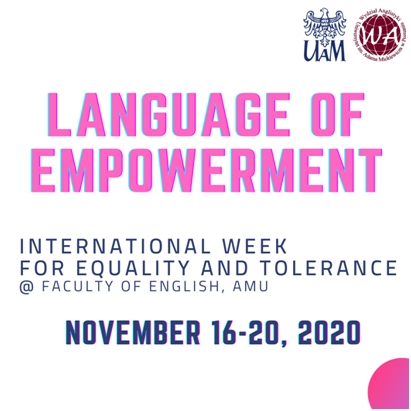Wydział Anglistyki UAM zaprasza do udziału w cyklu seminariów online pt. "Language of Empowerment” w ramach wydarzenia International Week for Equality and Tolerance, odbywającego się w dniach 16-20 listopada 2020 r. Wydarzenie rozpocznie się w Międzynarodowy Dzień Tolerancji i będzie okazją do przedstawienia zagrożeń wynikających z różnych form dyskryminacji oraz szansą na zabranie głosu w dyskusji na temat znaczenia wartości takich jak równość i tolerancja.
“Language of Empowerment” to sześć 45-minutowych wykładów w języku angielskim (poniedziałek-czwartek) i polskim (piątek). Wszystkie wykłady będą transmitowane na żywo na Facebooku Wydziału Anglistyki: www.facebook.com/wydzialanglistykiuam
Program wydarzenia:
PONIEDZIAŁEK, 16/11/2020, 18:00
Otwarcie wydarzenia: prof. Joanna Pawelczyk, Dziekana Wydziału Anglistyki UAM
Dr Samuel Bennett, Wydział Anglistyki UAM
'We' are good, 'they' are bad: Using language to exclude
You have probably all seen hate speech - like racism or homophobia - on social media, or even seen it on the nightly news. But how does it work in language? What do we do with words to exclude people? And how does social media amplify this? In this lecture we will dig into the answers to these questions and more through analysis of different examples from Twitter, political speeches and newspapers.
WTOREK, 17/11/2020, 18:00
Dr Katarzyna Burzyńska, Wydział Anglistyki UAM
(In)visible and (dis)abled bodies: English early modern dramatists stage pregnant embodiment
In the Generation of Animals Aristotle famously said that “the female is [...] a deformed male”, while the life-giving principle is exclusively male. In Aristotle’s writing women emerge merely as vessels in which life is generated. Early modern medical discourse was deeply ingrained in the Aristotelian and Galenic mistrust of female physiology. Modern feminist writers often point out that we still live in a reality where women’s complex, cyclical and ever-transforming bodies are measured against the myth of the supposedly transparent, fixed male embodiment. In other words, modern life is built by and for a fraction of humanity; the able-bodied (white) men. Utilising modern feminist phenomenology and disability studies this lecture looks at the early modern conceptualizations of female “pregnant” embodiment in the dramas of Shakespeare and his contemporaries. The aim of the presentation is twofold; to present contradictory but often revolutionary depictions of pregnant characters in drama but also to build a bridge between texts of the past and modern theory. This way canonical texts may serve us in promoting social justice, inclusivity and diversity.
ŚRODA, 18/11/2020, 18:00
Prof. Agnieszka Kiełkiewicz-Janowiak, Wydział Anglistyki UAM
Gender specification of nouns naming people in Polish: Toward social inclusion and equality?
Gender, as a fundamental social category, is represented in all languages. However, along with the reference to maleness or femaleness, linguistic structures reflect and perpetuate a dominant “gender belief system” of the community (Stahlberg et al. 2007). What are then the social consequences of encoding gender in language and can they be changed by a language reform? We will look into the Polish language, against the background of English and some other languages. Specifically, the focus will be on the increasing use of feminitives in Polish, nouns naming occupations and functions of women (rektorka, adiunktka, studentka), as well as the complexities of their morphology. The socially-motivated language reform lying behind this process will be confronted by arguments from the language system on the one hand and by public debate on the other. If gender-biased language contributes to an unfair representation of people in society, can anything be done about it?
CZWARTEK, 19/11/2020, 18:00
Dr Rafał Jończyk, Wydział Anglistyki UAM
“Women are struggling with task”: How stereotype threat affects creativity in female engineers
If I asked you to imagine an engineer or a computer scientist, you would probably picture a man. Why? Possibly, because there are few female engineers or female computer scientist. But why? Research shows that experiences of stereotype threat among women made them more likely to leave engineering, computer science, and mathematics majors (Beasley & Fischer 2012). Also, negative group dynamics related to gender stereotyping during team-based school projects and internships was the main reason for women to leave, or consider to leave, the field (Seron et al. 2016). In this talk, we will discuss the impact of stereotype threat on female performance in a variety of domains, with a specific focus on creativity. The main part of my talk will be devoted to our recent study that measured female engineers’ brain dynamics during creative performance before and after the experience of stereotype threat.
PIĄTEK, 20/11/2020
14:00
Prof. Błażej Warkocki, Wydział Filologii Polskiej i Klasycznej UAM
Od „sztuki przewrotnej” do „literatury queer”: Nieheteronormatywne wątki kultury polskiej
W swoim wystąpieniu chciałbym w syntetyczny sposób przedstawić kluczowe wątki nieheteroseksualne w polskiej literaturze XX i XXI-ego wieku. Od motywów i koncepcji powstałych w 20-leciu międzywojennym po najnowsze zjawiska literackie. Rzecz będzie dotyczyć zarówno używanego języka, jak i tematów, toposów czy tajnych znaków. W tym kontekście dokonam skrótowej typologizacji twórczości najważniejszych autorów i autorek - tych znajdujących się obrębie kanonu literackiego, jak i na jego obrzeżach. Analizy języka tekstów literackich i krytycznoliterackich staną się punktem wyjścia do szerszej refleksji dotyczącej kultury polskiej w oparciu o najnowsze prace akademickie dotyczące tematyki queer.
15:00
Dr Joanna Śmiecińska (Wydział Anglistyki UAM) & Dr Jowita Wycisk (Wydział Psychologii i Kognitywistyki UAM)
Rodziny LGBT+ w Polsce: Od stresu mniejszościowego do zmiany społecznej
W wystąpieniu nawiążemy do pojęcia stresu mniejszościowego, wskazując na specyfikę naznaczenia społecznego, z jakim borykają się w heteronormatywnym społeczeństwie osoby nieheteroseksualne. Dotyczy ono między innymi postrzegania tych osób jako niezdolnych do życia rodzinnego, opartego na międzypokoleniowych więziach, trwałych relacjach czy rodzicielstwie i wspólnej trosce o dzieci. Odwołując się do danych z dostępnych polskich badań, zobrazujemy życie rodzinne osób LGBT+, w tym zwłaszcza rodzin, w których dzieci wychowywane są przez osoby tej samej płci. Zaprezentujemy fragmenty wywiadów z dziećmi i wskażemy na specyficzne potrzeby samych dzieci oraz ich rodziców. Upatrując w wyzwaniach społecznych czynnik prorozwojowy, pokażemy, jak osoby LGBT+, ze szczególnym uwzględnieniem tzw. tęczowych rodzin, radzą sobie ze stygmatyzacją i angażują się w zmianę społeczną oraz jakie czynniki zewnętrzne zwiększają ich dobrostan.

